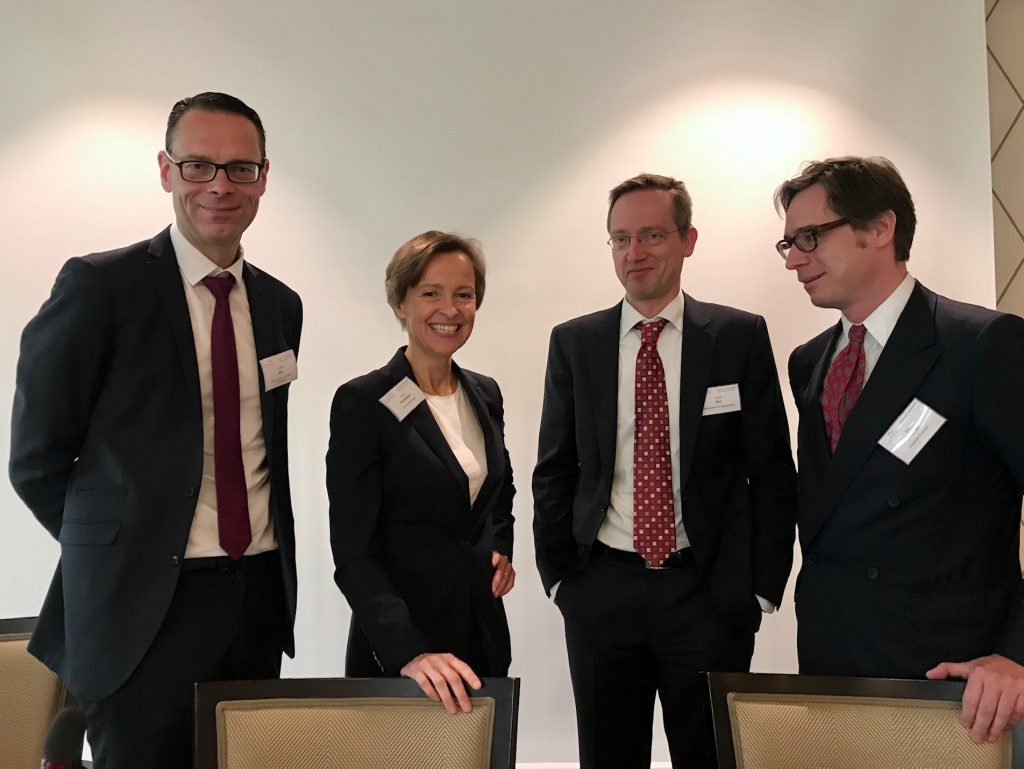
SSNIPpets (35): Fall of the Wall
This weekend, Germany celebrated the fall of the Berlin Wall 30 years ago. A day of freedom – and also a day that gave the go-ahead for the introduction of the market economy in the Eastern part of Germany. The road to competition was not easy to take. Somewhere in Western Germany, Rupprecht Podszun celebrated the day so that SSNIPpets were delayed… here they are now, the small but significant news, information and pleasantries – our pet project!
An open wound
Before the people in East Germany fought for freedom, people in Poland had already taken to the streets and gone on strike against a paternalistic and oppressive state. When I was in Warsaw a few weeks ago, I happened to pass the doors of UOKIK, the competition authority Urząd Ochrony Konkurencji i Konsumentów, which is quite active. UOKIK has just imposed a hefty fine for non-cooperation during the merger investigation of the Nord Stream II joint venture.

So, on the one hand, Poland stands for the self-confident enforcement of European competition law in Eastern Europe. Cases that originated from competition agencies in countries that just 30 years ago were still under a, well, Socialist rule, have become important precedent for all Europe – just think of Eturas (Lithuania), Allianz Hungaria (Hungary), VM Remonts (Latvia), Toshiba (Czech Republic) oder Tele2Polska (Poland).
On the other hand, Poland has become a symbol for the erosion of the rule of law caused by a right-wing government – that is an open wound thirty years after the overcoming of the Eastern bloc apparatus. Maciej Bernatt, an antitrust lawyer at the University of Warsaw, has shown in this paper how the judicial reforms in Poland and Hungary affect antitrust law. According to Bernatt, the EU, which has so far worked with the combined forces of the Juncker Commission and the European Court of Justice to combat the governments’ grip on an independent judiciary, should also have this concern on its radar with a view to independence and expertise in the enforcement of EU antitrust law.
…came out the best, nearly the best…
We’ll stay in Poland, but change genres. Adam Zagajewski is a writer, his poems were not allowed to be published by state publishing houses in Poland until 1989. He himself went to the USA and Paris via West Berlin in 1981, before returning to Krakow in 2002. He teaches at the University of Chicago, a place we will talk about later.
German daily FAZ published a poem by Zagajewski in its series called “The Frankfurt Anthology” a few weeks ago (including a video where the poem is read by Thomas Huber). The German title of that poem is “Wettbewerb”, in English: Competition. That makes it obvious why we have to talk about it here. If you do not read German poetry, there is an English translation here, and the title is: “Public Speaking Contest”. The Polish title is “Konkurs”. Anyway, it is about competition. Please take five minutes of your precious office hours to indulge in poetry. I don’t even try to interpret the poem. Just one sentence: The way it captures pain & glory of competition in so few words, that is just… art.
The reform of the Vertical Block Exemption Regulation
Let’s get back to reality quickly. The EU is consulting. It has just invited comments on horizontal agreements, the consultation documents are here.

In the vertical area, we are already a few steps ahead. The consultation has produced a great deal of feedback. Marieke Scholz from DG COMP is on tour to explain that she cannot say much yet, for example at our conference in Brussels or at the Professors’ Conference of the German Federal Cartel Office, the Bundeskartellamt. (Florian Wagner-von Papp has already written here about the Bundeskartellamt paper on vertical restraints in preparation of that annual gathering of competition law and economics professors.) There will be a stakeholder workshop in Brussels in mid-November. A consortium including the Italian-led Brussels consultancy VVA, the Milanese law firm Grimaldi and the Austrian Institute for Economic Research, among others, is preparing a study on the evaluation of the Vertical Block Exemption Regulation, which will be available in March/April.
According to Marieke Scholz, the three main anchor points for the “retrospective assessment” of the vertical regime are the Final Report on the e-Commerce sector inquiry of 2017, the Commission’s decision practice in the cases Consumer Electronics (2018), Guess (2018), Nike and Sanrio (both 2019) as well as the Policy Brief on platform bans following the Coty decision of the Court of Justice.
If these are the starting points for the review of the Vertical Block Exemption Regulation, the need for change seems limited, since the Commission will hardly give bad testimony to its previous practice. The logical conclusion: We have mastered the challenges of this time with the tools we have. Perhaps it would be more appropriate, though, given the massive changes in trade, not to evaluate and further develop the regime on vertical restraints, but to start from scratch.
The Commission is pretty sure, it seems that one aspect needs to change: Practice in Member States needs to be aligned. They do things there, goodness gracious! How such a harmonisation may work if the BER is not to get out of hand, if guidelines can still not be binding and if the Commission wants to keep the work manageable for itself, remains to be seen. (The idea that diverging approaches could also be appreciated as a discovery procedure, as a competition of ideas, is only quietly moving in the back of my mind…).
Vertical, Vertigo, Verticutter
The results of the Commission’s consultation show that a large number of stakeholders want a great many changes. Sure: Online trade was hardly addressed properly in the last vertical BER and the guidelines – and has since become an even more pressing issue. For example, the Commission’s Summary Document on the consultation states that 62% of respondents believe that the Vertical Block Exemption Regulation needs to be changed in the light of the changes in the markets over the last five years – 73% of respondents see this necessity for the Guidelines. So it is not a bold statement if I write now: there will be a lot more to come.
But it will
probably not go in the direction that Christian Wey would like to see. Wey was
assigned took the role of laisser-faire economist on the podium at the
professors’ conference at the Bundeskartellamt. His – let’s say – remarkable
general criticism of the Vertical BER prompted host Konrad Ost to ask whether
Düsseldorf, where Wey researches and teaches at DICE, is the new Chicago.
This comparison is somewhat evident since the metropolitan area of Chicago has
around 10 million inhabitants – as does the metropolitan area of Düsseldorf. In
terms of antitrust law, however, Düsseldorf does not stand for a monoculture of
ideas, but for diversity and competition.
But even Chicago is no longer Chicago. Luigi Zingales, who is in charge there today, acts like an antipode to Chicago School luminaries like Richard Posner and Robert Bork. And even the draft of the German competition act (about which we have just written in CPI by the way) looks non-interventionist in comparison to the report of the Chicago-based Stigler Center on Digital Platforms.

During the discussion of the Vertical Block Exemption Regulation in Bonn, one of the first questions from the learned audience took me by surprise: Is it a concern of the Commission that city centers in European towns are deserted since e-commerce drives brick-and-mortar-retailers out of business? This question surprised me since just a few years ago most antitrust experts would have raised their eyebrows and thought: “But that has nothing to do with antitrust law, pleeeeze”. This has changed: Friends of competition nowadays have to answer the question of the effects of their policies. People who push online trade, e.g. in the name of the single market, are accountable to explain why the nice shops in beautiful city centers are closing and why parcel delivery vehicles are blocking the streets.
Green Antitrust: The next big thing?
Recently, with a view to the GCLC conference in Brussels on Sustainability and Competition, I tweeted that the next big thing in antitrust law is environmental protection. “Green antitrust”, if you so wish. A friend wrote me a message: “You better be kidding me.”
Well, my opinion doesn’t really matter, perhaps Margrethe Vestager’s does. She gave the keynote speech at the aforementioned conference, which is a statement in itself. She quoted Hannah Arendt, the philosopher who is a favourite of Winfried Kretschmann, a German politician from the Green party who in a miraculous way reconciles greenish ideas with the interests of his Baden-Württemberg car industry. (The parallel of Vestager and Kretschmann strikes a chord with me, but anyway.) Vestager put it this way:
“For Hannah Arendt, the miracle of beginning was less about what we do, and more about the simple fact that we make a start. (…) Today, sustainability is at the centre of our politics. But in a way, we’re still very much at the beginning. We’ve made a commitment to sustainability; but we’re still working out exactly what has to change, to make that promise a reality. And every one of us – including competition enforcers – will be called on to make our contribution to that change.”
This statement does not really go far in terms of content. And I may remind dear readers that she had sent a clear-cut rejection to the thousands of environmental activists, who had begged her to stop the Bayer/Monsanto merger:
“While these concerns are of great importance they do not form the basis for a merger assessment.”
So, it is the Bundeskartellamt (whose representative Felix Engelsing took part in the conference) that is the frontrunner in the eco-segment of antitrust with the case Initiative Tierwohl (on which we had reported here).
Awesome!
In 1989, when the Wall came down, “Wahnsinn” was the word to say. It probably best translates into “awesome” in English, although this loses the notion of madness included… 30 years later Germans say “Bahnsinn” once in a while to characterise that they often find themselves in shock and awe in German trains (= Bahn). Okay, I shouldn’t try to explain puns that only in work in German. So, German rail is somewhat deteriorating.
Now, the German Monopolies Commission, an advisory Committee to the government on questions of competition, presented two reports in recent months, one on the energy industry, one on railways.
The Commission’s plan for the railway sector is simple and convincing. Paragraph 356 of that study reads:
“In the opinion of the Monopolies Commission, obstacles to competition arise from the DB Group’s organisational model [DB is Deutsche Bahn, the state-owned railway company]. For reasons of regulatory policy, the infrastructure should be vertically separated from the DB Group’s transport companies in terms of ownership rights. In this context, the Federal Government should sell all parts of the company active in competitive markets”.
Breaking up Deutsche Bahn. The Federal Government would only operate the rail network and divest itself of the rest of the DB Group. The remaining division, currently DB Netz, would have to be liable, as the next logical step, for problems caused by it. Such liability is apparently not established at present, so that a basic pillar of economic common sense does not apply: Hold the people accountable for their wrongdoing.
Mme. Vestager will perhaps soon have the opportunity to deal with DB. Competitors turned to her to criticise a planned capital increase (for climate protection) as inadmissible state aid.
Ministerial approval: Airy-fairy
Re the Monopolies Commission: Achim Wambach and his team had to do another expert opinion in between the energy and the railway expert opinions, namely whether to grant a ministerial permit in the Miba/Zollern case, a merger blocked by the Bundeskartellamt. The Commission was of course opposed to this, but of course the Federal Minister of Economics was not impressed. (By the way, his Ministry is located directly where the Berlin Wall used to divide Berlin. In a mini-movie, the Ministry reports on what happened on these premises in the past. History. Creepy.)
Now a juicy detail of the granting of that permission has been worked out beautifully by a Request for Information of the liberal party, FDP, in the Bundestag. The Liberals had asked the government about the circumstances of that ministerial approval. The question was answered very snippy, this is how it goes from government to opposition. But the answer to question 6 is nevertheless worth a read.

As a reminder, the public interest issue that was to trump the Bundeskartellamt’s ban according to the Minister was the indispensability of the merger for the transformation of energy systems. In Germany, climate change primarily clings on the question of plain bearings for wind turbines… that’s how it is, #futurekids!
“The joint venture made possible by the ministerial approval can decisively advance the energy revolution with its research, development and production of plain bearings. In this environmental policy objective lies an overriding interest of the general public, which exceptionally outweighs the restriction of competition established by the Bundeskartellamt”. (Source: Press release of the Minister, emphasis only here)
The FDP wanted to know this:
“6. According to the Federal Government, how high is the proportion of plain bearings produced by the two companies that are used for applications in the field of renewable energies?
Answer from the Federal Government:
“Some of the applications relevant to renewable energies are future applications that can only be made ready for the market through joint research and development by Miba and Zollern in the joint venture. This also includes the bearings mentioned in the question. As these are future applications, the German government cannot provide any information on this.”
Oh dear, Greta, the turnaround for renewable energy in Germany has to be postponed, because: Miba and Zollern not even have anything on offer here! The Bundeskartellamt was outvoted because there is hope that something could be brought to the market sometime in the future… Who would have thought that the idea of “innovation spaces” known to us since the merger control decision Dow/Dupont would be taken over so enthusiastically by the German Government?
I read
paragraphs 181 et seq. of the Minister’s
permission decision. There, under the heading “Specific contribution of the joint
venture” (emphasis only here), it is described what the combination of galvanisation
and sputtering might bring for plain bearings. Oh, I would have loved to read
the slashing appraisal of these paragraphs by the 1st Cartel Senate of
the Higher Regional Court of Düsseldorf! Unfortunately, the right of appeal
against the ministerial approval decision has been abolished, so that we will
not witness this spectacle. Ceterum
censeo: The power of approval for the Minister esse delendam.
Miscells (this and that)
- The competition authorities from Belgium, the Netherlands and Luxembourg have published a joint memorandum in which they deal with enforcement in the digital economy – with new ideas.
- The Bundeskartellamt and the Autorité de la Concurrence have just published a paper on algorithms and competition.
- The Monopolies Commission has published a Call for Papers. And it is in English, too! *Gasp* It is about “market power trends”, deadline: 15.12.2019. The openness of the Commission, which speaks from this procedure, is appreciated.
- The Academic Society for Competition Law, ASCOLA, has also published its Call for Papers for the next Annual Meeting 2020 in Porto. Deadline: 27.1.2020.
- Georg Götz, an economist from Gießen, and Andreas Fuchs, a lawyer from Osnabrück, have confirmed to the German Publishers and Booksellers Association with expert opinions that the fixed book prices in Germany considerably promote the dissemination of books as a cultural asset and are compatible with EU law. The economic report offers numerous, apparently new data analyses. No changes needed, accordingly. Yet, the marketing slogan of the trade association remains rather strange: “Price comparison futile. Thanks to fixed prices for books”.
A revolutionary is tested

There is a lawsuit pending with the Regional Court Munich I regarding the Trucks Cartel. An organisation collected the damage claims of transport companies and now sues for damages amounting to 867 million € (Case Number 37 O 18934/17). It is well known who represents whom in this epic battle, but one detail was new to me: The guy behind the plaintiff’s organisation is Sven Bode, an industrial engineer with a PhD, and a co-founder of Flightright. Flightright (and other legal tech based providers) opened up the market for passenger rights. Their business model led to a revolution in claiming compensation for flight passengers.
Having said that, one has to state that enforcing passenger rights is – in comparison to claiming cartel damages – as if you would compare making a paper plane to building a real aircraft.
The ski is the limit
As is well known, many readers of this blog swap the somehow tight, but welted leather shoes for the much tighter ski boots during the holidays at the end of the year. Off to the slopes in the Alps or at least in the Sauerland! Sometimes, though, you do not get rid of thinking of antitrust law in those days off. So, let us take a look to the Matterhorn now, so that you have that off your desk when hitting the traffic jam to Switzerland.
Stöckli Ski, a Swiss ski equipment supplier, had to pay a fine of 140,000 Swiss francs because of retail price maintenance (RPM). The Kluwer Competition Law Blog reported on the Weko’s decision. Not so beautiful.
Another news from Switzerland may be more heartening for some. In Switzerland, an initiative for “Fair Prices – Stop the High Price Island!” had collected more than 100,000 signatures to place a provision on relative market power or superior bargaining power in Swiss antitrust law and to get rid of the “Swiss surcharge” on imports. We hear that it is common for government and parliament to avoid a referendum by presenting a slightly moderated counter-proposal, which then prompts the initiators to renounce the vote. The first parliamentary deliberations have now taken place, in which an acceptable legislative proposal appears to have emerged. The modernization of the Swiss abuse control is progressing with it – and so we are almost at the topic of the German competition law reform (#GWB10), which I wanted to leave out in these SSNIPpets.
Thus, please quickly improve your Wedeln with this video from the 1980s – and enjoy the week!
Rupprecht Podszun is on Twitter now: @ruppe_p.